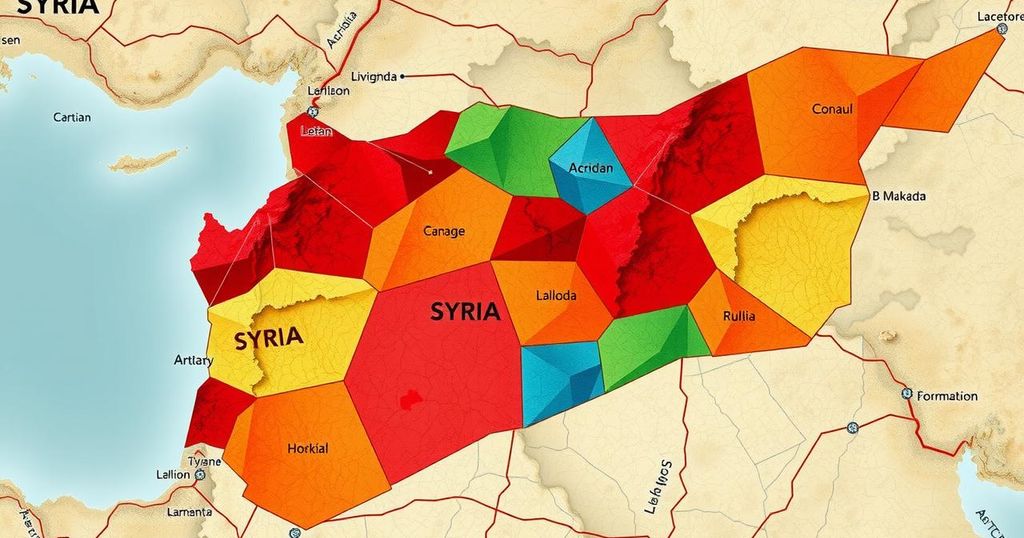Israel Exploits Syrian Sectarian Violence Amid Government Inaction
Israel is exploiting the Syrian government’s failure to protect minority rights, particularly the Druze community, following increased sectarian violence. With over 100 fatalities, the government has been criticized for its inaction in stopping attacks. As Israel increases its military intervention, analysts suggest they aim to reshape Syria’s political landscape in their favor, including ambitions for full annexation of the Golan Heights.
In recent developments, Israel appears to be capitalizing on the Syrian government’s inability to safeguard minority rights, particularly those of the Druze community. Following a surge in sectarian violence that led to over 100 deaths in predominantly Druze regions, analysts have noted Israel’s positioning as a supposed protector of this minority. The violence was sparked by a controversial voice recording that falsely implicated a Druze cleric in insulting the Prophet Mohammed, leading to retaliatory attacks by Islamist militants, some of whom are linked with the Syrian regime itself.
The aftermath has seen the Druze communities in towns such as Jaramana and Suweida rallying in defense. Yet, Israel’s military involvement escalated considerably, particularly with air strikes near the Syrian Presidential Palace, a significant increase in its military engagement since the previous year. Prime Minister Benjamin Netanyahu justified these strikes as necessary for the protection of the Druze community and to prevent Syrian forces from stationing too close to the Israeli border.
Observations from experts in the field suggest that this strategic timing from Israel is no accident. With Syria’s governing authority in disarray and overwhelmed by internal strife, some believe Israel sees this moment as an opportunity to influence the post-Assad landscape. Riad Kahwaji, head of the Institute for Near East and Gulf Military Analysis, indicated that Israel desires a fragmented Syrian state that, in theory, could enhance its own security and legitimacy.
The dynamic appears to favor the creation of separate enclaves—Druze, Kurdish, and Alawite—potentially undermining a unified Syrian state. Mr. Kahwaji explained that a strategically fragmented Syria aligns with Israel’s long-term goals, which include establishing a Druze buffer state to counter perceived threats from future Syrian leadership, particularly one that might be supported by Turkey.
Compounding the complexity of the situation, Israel’s aspirations seem to include the full annexation of the Golan Heights. Currently, Israel controls two-thirds of this region, which it unilaterally annexed in the early 1980s—a move that has never been recognized by the international community. With ongoing military actions, analysts suggest Israel is prepared to negotiate for formal recognition over the entirety of the Golan Heights.
In response to Israel’s air strikes, Syrian authorities condemned the actions as violations of international law and a threat to stability in the region. They also highlighted the role of extremist groups in triggering violence, though the government has been criticized for its lack of preventive measures and accountability. Indeed, the authorities faced accusations of inaction as sectarian violence surged after the government transitioned its control post-Assad.
Joseph Daher, a Syrian academic, remarked on the government’s approach to consolidating power, expressing concern that the ongoing sectarian strife is part of a larger strategy to reclaim and reinforce government control in unstable areas. He underscored that the Druze community is largely resistant to any Israeli manipulation of their plight, yet paradoxically, the government’s inaction could embolden factions calling for collaboration with Israel in times of crises.
This tactic of using sectarian conflicts reportedly mirrors earlier state actions, wherein defectors from the regime targeted the Alawite minority under the guise of combatting insurgent forces. Yet many perceive that the government has failed to deliver accountability for past and present violence against civilians, leading to skepticism surrounding its commitment to achieving security in Syria.
Israel’s ability to exploit the Syrian government’s failures seems to have coincided with a rise in sectarian tensions, further complicating an already volatile landscape. As the situation evolves, the implications for regional stability remain profoundly concerning, particularly if the cycle of violence and government negligence continues.
In summary, the ongoing sectarian violence in Syria is increasingly being leveraged by Israel, which presents itself as a protector of the Druze community. The Syrian government’s failure to address and prevent attacks against minorities plays directly into Israel’s strategic objectives, as it seeks to reshape post-Assad Syria while pursuing annexation of regions like the Golan Heights. As the conflict develops, the implications for minority rights in Syria—and for regional geopolitics—are significant and troubling going forward.
Original Source: www.thenationalnews.com




Post Comment